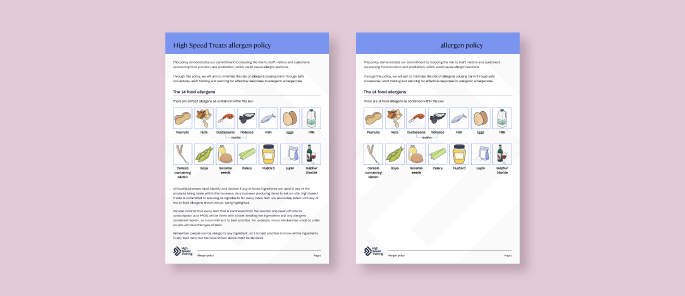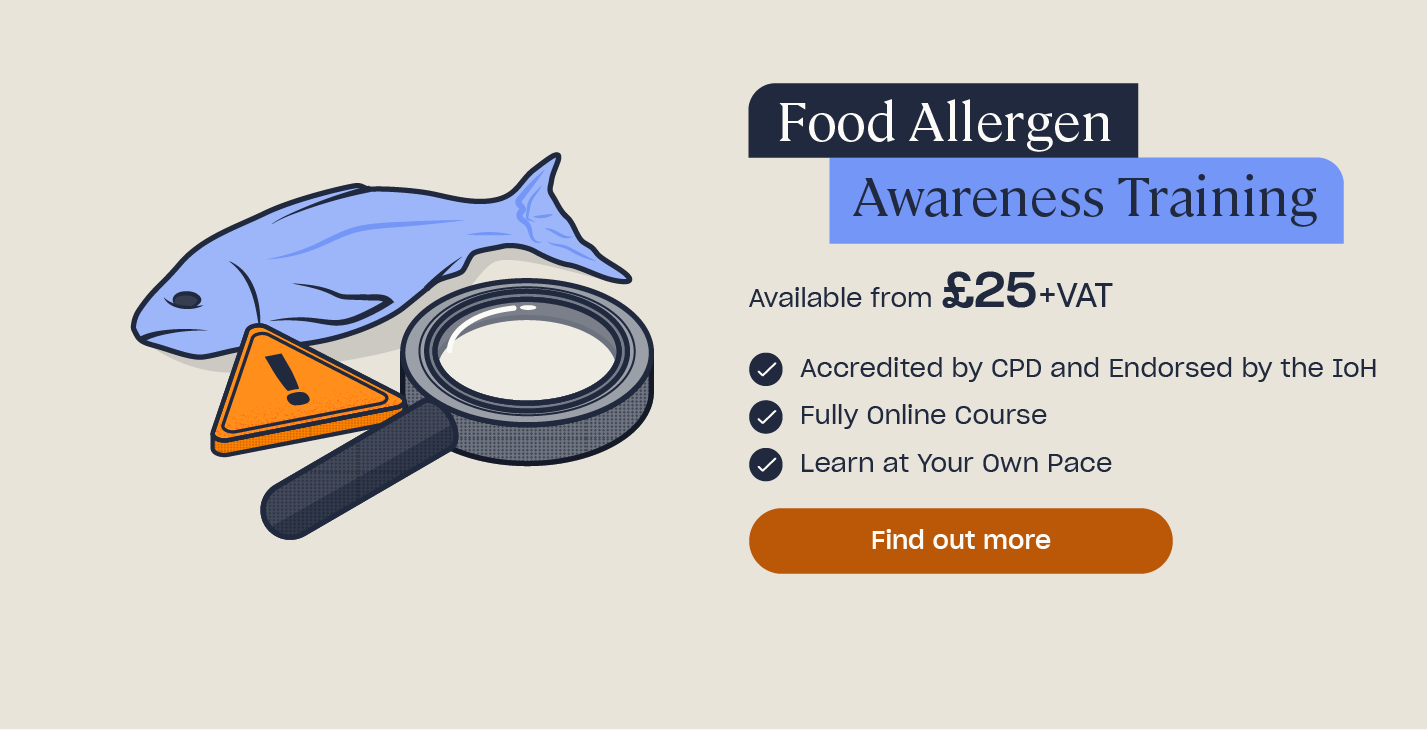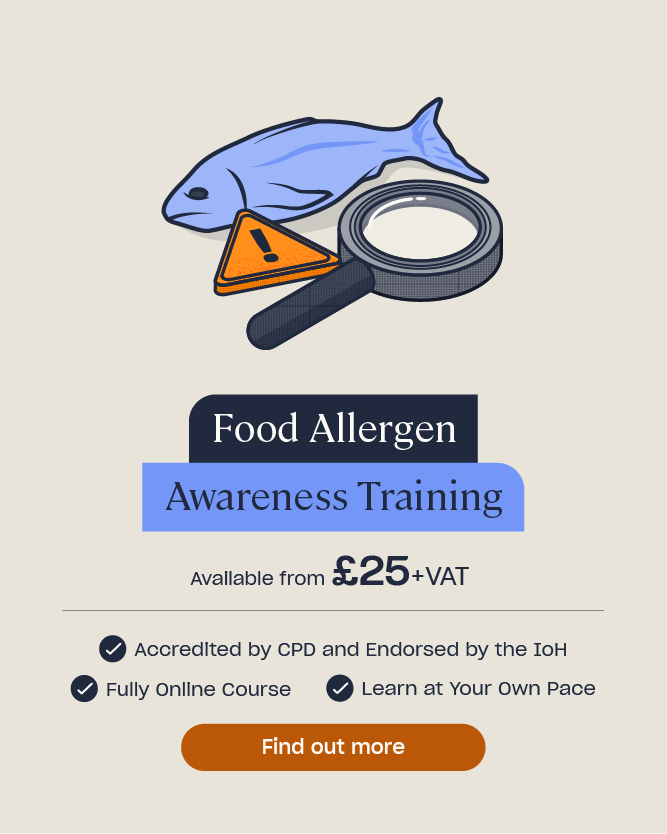Food Allergen Policy: Free Template
If you work in hospitality, it is vital that you have an understanding of allergens and can demonstrate your commitment to reducing any potential risk. A lack of knowledge around food allergies can have devastating effects and can even result in death. Therefore, it is essential that you ensure the health and safety of your guests and staff alike.
In this article, we will outline the purpose of a food allergy policy and the information that it should include. We will also provide you with a downloadable food allergen policy template for you to use when writing your own food allergen policy.
What is a Food Allergen Policy?
Food allergen policies demonstrate an organisation’s commitment to reducing the risk to staff, visitors and customers concerning food provision and production which could cause allergic reactions. Not only do food allergen policies demonstrate that you are conscientious and care about your customers, visitors and staff, but they also show your dedication to preventing allergic reactions wherever possible.
Any business that produces, manufactures, distributes, sells and/or handles food needs an allergen policy. This will provide you and your staff with information on how to handle, store, prepare and serve allergenic food products safely.
Those responsible for creating food allergen policies are senior leaders in the business. For example, the business owner, the head chef or the manager. This should be done in collaboration to ensure it meets the correct criteria and then should be communicated with everyone in the business.
Food Allergens Report 2024
In our Food Allergens Report 2024, we have investigated the current state of allergy safety in UK eateries. Eager to uncover the truth? Read the report here.

Why is an Allergen Policy Important for the Food Industry?
Food allergen policies show staff, customers and food safety officers that you take the control of food allergens seriously. It also demonstrates that you have considered the hazards and have implemented control measures to prevent people from coming to harm.
Having a food allergen policy is important to ensure you are complying with regulations. Not only does it benefit the customers at your business, but it also benefits your staff.
Staff must be trained on allergens so they can do their job, the food allergen policy can be used to guide staff to giving customers the right information. As a customer, it is reassuring to know that you’re eating in a place where staff know exactly what is in each dish and have the paperwork that outlines the steps the business takes to create allergen safe dishes.
Want to Learn More?
Our Food Allergen Awareness Training will teach you how to comply with UK allergen awareness regulations and increase your understanding of common food allergens. You can also read more about Food Allergen Risk Assessments and Near Miss Reporting in our articles.

A lack of understanding around food allergens and food hyper-sensitivity can have fatal consequences, therefore it is essential that you do all that you can to prevent allergy incidents.
Unfortunately, not all businesses have the necessary safety precautions and controls in place which has had fatal consequences. These devastating cases of fatal food allergen incidents have led to advancements in regulations, such as with Natasha’s Law. Other campaigns, such as Owen’s Law, seek to further improve the way businesses communicate allergens with their customers.
Owen’s Law
The tragic case of Owen Carey highlights the consequences of providing inaccurate information to those with food hypersensitivities. Owen was 18 years old when he suffered a fatal anaphylactic reaction.
Owen, who was allergic to multiple foods, including dairy, had ordered a chicken burger at a Byron restaurant in London. He was informed by the waiter that the dish was dairy free, but the chicken was marinated in buttermilk.
Shortly after leaving the restaurant, Owen began to suffer from symptoms of anaphylaxis which became increasingly worse before he collapsed and died. An inquest into his death discovered that the allergenic ingredient, buttermilk, was not clearly declared on the restaurant’s menu or by the server with whom Owen communicated.
Since Owen’s tragic death, his family have fought to change the law so that restaurants must state the allergens in their products clearly on the menu. This change could save lives.
The FSA (Food Standards Agency) agreed at their board meeting on 13th December 2023 that written allergen information should be compulsory in food businesses like coffee shops and restaurants. This is an important step in allergen awareness and board members will now write to the Government calling for change, backing the Owen’s Law argument.
What Should my Business Include in the Food Allergen Policy?
The food allergen policy is a tool your business can use to ensure safe procedures in handling allergens, it will help train your staff on the correct procedures to follow giving them information and it can also be used to demonstrate to customers the steps the business takes to reduce the risk of allergenic contamination. Therefore your food allergen policy should be detailed and thorough, and include what you need it to for your own business.

As a guide, the policy should lay out the following:
- The purpose of the policy: start by outlining what the policy is and the main objectives.
- The 14 food allergens: the policy should list the 14 food allergens contained within the law. You can find a free poster of the 14 allergens here.
- Allergy labelling legislation and regulations: explain the relevant regulations and legislation that the policy covers and how the business complies with them.
- The business’ commitment: outline the ways in which your business takes precautions to ensure food allergen safety.
- Background information: provide an overview of food allergens, food intolerances and who is at risk or affected by food allergies.
- Responsibilities within the business: outline who is responsible for creating the food allergen policy and other documentation, the responsibility of the staff in the business, the chefs and senior leadership etc.
- Allergen information: explain how food allergen information is gathered, including training and documentation.
- Information for customers: describe how information about food allergens is shared with and provided to customers.
- Procedures: explain the procedures and precautions taken to ensure safety. This should include kitchen procedures, such as storage and preparation of food, service procedures, cleaning procedures etc.
- Emergency situations: explain what to do in an emergency situation, for example, if a customer has a severe allergic reaction.
- Inclusivity: describe how the business ensures that those with food allergies and intolerances are catered for in the business.

Food Allergen Policy Template
Below is an example of a food allergen policy we have created for our fictional company, High Speed Treats. The information provided in the example demonstrates what a policy could look like and what sections it should include. You can use this as a prompt for your own business’ food allergen policy, however, you should make sure you create a policy to suit your business’s specific needs.

We have also attached a blank food allergen policy template below that you can download and edit. Take a look at our example food allergen policy and download your blank template on the buttons below:
We hope you have enjoyed reading this article and have learnt about the importance of food allergen policies. If you have any further questions or wish to find out more information on the topics covered in this article, please don’t hesitate to get in touch with us at High Speed Training!
Further Resources:
- Food Allergen Awareness Training
- The Importance of Near Miss Reporting in Hospitality
- Food Allergen Risk Assessment & Checklist: Free Templates
- What Should a School Food Allergy Policy Cover?
- Food Allergen Labels: Free Download & Advice











